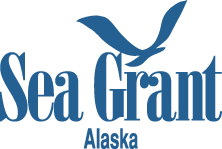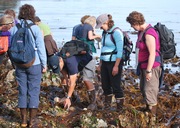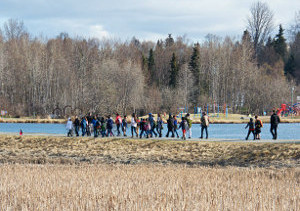| Class Time Required | 3 class periods |
| Materials Needed |
|
| Teacher Preparation | 45 minutes to read, make copies, and obtain food samples |
| Prior Student Knowledge | Knowledge of habitat and food webs, and understanding of interconnections in ecological systems. See 4th grade “Mystery of the Sea Otter Unit.” |
| Vocabulary | Bidarki, Biodiversity, Endangered Species, Extinction, Harvest, Invertebrate, Leather Chiton/Katy Chiton, Mollusk, Predation, Radula, Subsistence |
| Science GLEs Addressed |
3rd grade: SA3.1, SE1.1, SE2.1 4th grade: SA3.1, SE1.1, SE2.1, SE2.2 5h grade: SA3.1, SE1.1, SE2.1, SE2.2 |
| Other GLEs Addressed |
![]() Overview: Students develop an understanding of interconnections among the ocean, humans, and other living things through a case study of harvesting bidarki (katy chitons) in the Alaska Native villages of Port Graham and Nanwalek. They reflect on their own connections to the ocean.
Overview: Students develop an understanding of interconnections among the ocean, humans, and other living things through a case study of harvesting bidarki (katy chitons) in the Alaska Native villages of Port Graham and Nanwalek. They reflect on their own connections to the ocean.








